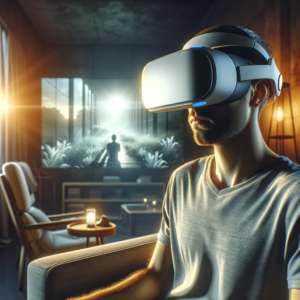No one is immune to mental health problems. If you’ve struggled to navigate mental health challenges in the past, you might want to try immersive therapy — especially if you’re a gamer. This article aims to introduce you to the concept of immersive therapy and highlight how it can be a valuable tool for anyone seeking mental wellness, and why gamers in particular may stand to benefit the most from such an approach.
What Is Immersive Therapy?
Immersive therapy is an approach that utilizes technology to create a therapeutic environment where patients can engage in simulated experiences. This method includes various forms such as virtual reality (VR)-based exposure therapy (or immersion therapy), augmented reality (AR) experiences for cognitive behavioral therapy, and therapeutic role-playing games (RPGs).
By using virtual reality and immersive gaming environments, individuals can be transported to a world that offers controlled exposure to their fears and anxieties. This exposure helps individuals confront and manage their phobias, PTSD, and other mental health conditions. The immersive nature of this therapy allows individuals to feel fully present, creating an impactful and effective psychological therapy tool. Through this integration of technology and therapeutic techniques, immersion therapy offers a novel approach to mental health treatment, offering hope and relief to those in need. Technology isn’t always needed, though, as tabletop RPGs have also been found to be therapeutic because of how they create a safe space for emotional exploration and experimentation, offering an engaging way to develop skills like problem-solving and decision-making.
What Are The Benefits Of Immersive Therapy For Gamers?

Immersive therapy offers gamers a range of psychological benefits, leveraging their gaming culture and providing a healthy form of escapism to address mental health challenges.
By integrating gaming-related activities and narratives into therapy, gamers can find a safe space to navigate their emotions while enjoying the immersive experience of their favorite games. This form of therapy allows individuals to explore their thoughts and feelings in a familiar context, promoting self-expression and stress relief. Immersive therapy encourages social connection among gamers, fostering a sense of community and peer support. Ultimately, by harnessing the positive attributes of gaming, immersive therapy can effectively contribute to the holistic well-being of individuals within the gaming community.
Reduces Stress And Anxiety
One of the primary benefits of immersive therapy for gamers is its ability to reduce stress and anxiety, promoting mental wellness through immersive experiences.
This therapy provides an escape from the daily rigors, allowing individuals to engage in captivating virtual environments that offer a sense of serenity and calm. By fostering a state of deep absorption, immersive therapy encourages relaxation and helps individuals disconnect from worries and pressures, ultimately leading to a more balanced and positive mindset.
The immersive nature of this therapy allows individuals to focus their attention on the present moment, minimizing overthinking and promoting a sense of peace and contentment.
Improves Focus And Concentration
Immersive therapy enhances gamers’ focus and concentration, fostering mindfulness through immersive interventions and gaming sessions.
This approach allows individuals to engage deeply with their surrounding environment, sharpening their attention to the present moment. By channeling their energy into the virtual worlds of games, participants can develop heightened awareness and control over their thoughts and reactions. Through this process, immersive therapy promotes a state of heightened focus that can extend beyond gaming activities, positively impacting various aspects of daily life.
It provides opportunities for individuals to practice and improve their concentration dynamically and engagingly, ultimately benefiting their overall cognitive function.
Enhances Problem-Solving Skills
Gamers benefit from immersive therapy as it enhances their problem-solving skills, utilizing emotional experiences as a therapeutic tool within immersive gaming environments.
This therapeutic approach allows individuals to engage with challenging scenarios in virtual worlds, providing a safe space to confront and address complex emotional experiences while actively problem-solving. By immersing themselves in these environments, individuals can develop resilience, adaptability, and creative thinking when faced with adversity, ultimately translating these skills to real-life problem-solving situations.
Emotional engagement within the gaming environment stimulates cognitive processes, leading to improved problem-solving abilities and a heightened sense of emotional intelligence.
Increases Empathy And Social Skills
Another significant benefit of immersive therapy for gamers is its capacity to increase empathy and social skills through emotional immersion within virtual environments.
By engaging in simulated scenarios that evoke intense emotions and decision-making processes, individuals can develop a heightened understanding of others’ perspectives and emotions, ultimately enhancing their empathy. The collaborative nature of many virtual environments encourages the development of social skills, as users interact with diverse personalities and learn to navigate complex social dynamics.
As a result, immersive therapy creates a nuanced and realistic platform for individuals to hone their emotional intelligence and adaptive social behaviors.
How Can Gamers Incorporate Immersive Therapy Into Their Routine?

Gamers have a unique opportunity to incorporate immersive therapy into their daily routines, utilizing gaming as a tool for mental relaxation and virtual therapy. Here’s how:
Being Intentional
When deciding which game to play, consider your current mental state. If you’re feeling anxious or stressed, choose a game that is known for its soothing environments and gentle gameplay, like Sky or Jusant. Avoid games with heavy emotional themes that might not align with your current mood, or non-competitive stress-inducing games like Dark Souls. The key is to engage with games that offer an escape into tranquility, helping you to reset and relax.
When you’re ready, move on to something that can be entertaining and competitive, like Hearthstone or Yu-Gi-Oh! Master Duel. Winning in competition, especially in the context of online gaming, can have a positive impact on mental health. Success in such environments can lead to a sense of achievement and satisfaction, contributing to an individual’s self-esteem and confidence. The challenge and subsequent victory in competitive games can trigger the release of ‘feel-good’ neurotransmitters like endorphins, which enhance mood and promote a sense of well-being.
However, it’s important to approach competitive gaming with balance. Overemphasis on winning can lead to stress and anxiety, especially if it becomes the sole focus. Therefore, maintaining a healthy perspective on gaming, and recognizing the value of participation and enjoyment over just winning, is crucial for mental well-being.
Use of XR Technology
VR gaming offers immense potential for immersive therapy, providing a platform for deep gaming immersion and therapeutic experiences within virtual environments.
Users can engage with virtual reality games in a way that fully immerses them in a different world, creating a sense of presence and spatial presence. This immersion can be utilized therapeutically to address phobias, anxiety, and PTSD, allowing individuals to confront their fears in a safe and controlled environment.
The interactive nature of virtual reality gaming and XR technology allows for personalized and immersive experiences, making it a valuable tool in therapeutic settings for enhancing emotional resilience and well-being.
AR can also be used to simulate real-life scenarios, allowing individuals to practice and improve social skills in a controlled environment. It’s also being explored for assessing mental health conditions, potentially improving the speed and accuracy of diagnoses.
Incorporate Role-playing Games
RPGs serve as a valuable component of immersive therapy, offering emotional support and contributing to gamers’ mental wellness through immersive storytelling and experiences.
These games provide a safe space for individuals to interact with complex narratives and characters, allowing them to explore different emotions and experiences in a controlled environment. This can be particularly beneficial for those struggling with emotional regulation or social anxiety, as it allows them to practice navigating challenging situations in a supportive and non-judgmental setting.
By immersing themselves in the game world, players can gain a sense of agency and accomplishment, which can contribute significantly to their overall mental well-being. Ph.D. candidate DJR Kerr and colleagues (2020) have highlighted that the narrative elements of Dungeons & Dragons (D&D), for example, often involve overcoming challenges and experimenting with different identities, which can reflect key aspects of mental health recovery. This alignment offers a unique pathway for emotional and psychological healing.
The clinical use of D&D dates back to at least 1994. In a notable instance, Wayne D. Blackmon, M.D. reported on the case of a 19-year-old individual with an obsessive, schizoid personality. Through the therapy sessions, it became evident that the patient’s engagement with D&D was more than just a game; it acted as a form of self-therapy. The patient’s character in the game served as a medium for expressing and processing emotions safely. Blackmon observed that the structured rules of D&D not only shaped the fantasy world but also provided a sense of security and structure, helping to alleviate anxiety and foster emotional exploration.
Reflect on Gaming Experiences
After gaming, take time to reflect on your experience and its impact on your mood and emotions. When you engage in such reflection, you enhance your self-awareness by becoming more cognizant of the kinds of games or in-game situations that trigger specific emotional responses, and can extend to understanding how gaming impacts your real-life interactions and day-to-day mood.
Incorporating reflective practices in gaming aligns with the broader therapeutic approach of mindfulness and self-awareness, which are key aspects of mental health treatment.
More Real-Life Case Studies of Immersive Therapy
We’ve found a few examples that demonstrate the potential for immersive treatment to transform mental health challenges. These case studies provide hope for individuals seeking effective ways of addressing their mental health issues, and as technology continues to evolve and revolutionize the field of mental health treatment, we’re bound to encounter similar cases closer to home.
A groundbreaking study led by Professor Daniel Freeman from the University of Oxford revealed the effectiveness of immersive treatment in tackling acrophobia, or the fear of heights, transforming the lives of individuals battling phobias and mental health disorders.
Participants in the study had sessions with a computer-generated virtual coach. The results were astounding, with more than half of the participants experiencing fear reductions of over 75%. This surpasses the outcomes typically seen in traditional face-to-face methods, indicating the immense potential of the technique in battling phobias.
However, the benefits extend beyond phobias. A study published in Psychological Medicine showed how immersive treatment can be a game-changer in the assessment, understanding, and treatment of various mental health disorders.
With individuals in virtual environments replicating their challenges, therapists can guide them through evidence-based treatments, empowering them to overcome difficulties.
For example, the advancements in 360° video technology were not only pioneering innovations but also paved the way making the technology realistically accessible to those who need it. Affordability and technical simplicity have allowed researchers and clinicians to implement and research mental health interventions more widely.
An Australian clinical psychologist demonstrated how the technology can effectively assist with claustrophobia (an irrational fear of enclosed spaces affecting about 13% of the global population mostly females) and needle phobias. Through repeated exposure, one can gain confidence and develop coping strategies to manage anxiety.
Under the guidance of Dr. Corrie Ackland, commonly feared situations such as claustrophobia and fear of flying are addressed. In this video, she highlights how virtual reality facilitates the safe confrontation of these fears by gradually exposing his patient subject to the source of his fear, allowing it to diminish over time.
What Are The Potential Risks Of Immersive Therapy?
While immersive therapy offers numerous benefits, it also poses potential risks such as motion sickness and the risk of gaming addiction, requiring a balanced and cautious therapeutic approach.
The immersive nature of virtual reality experiences in therapy can lead to motion sickness in some individuals, impacting their well-being and hindering the therapeutic process. Similarly, excessive use of gaming elements in immersive therapy may heighten the risk of gaming addiction, highlighting the need for careful monitoring and moderation.
It’s crucial for therapists to integrate these concerns into their treatment plans and maintain a balanced approach that maximizes the benefits while minimizing potential risks.
Motion Sickness
Motion sickness can impact individuals’ mental state during immersive treatment, necessitating measures to address and mitigate its effects within immersive therapy sessions.
It’s essential to recognize that motion sickness can lead to feelings of nausea, dizziness, and disorientation, which can significantly disrupt the immersive experience. This disruption can hinder the effectiveness of the therapy and may cause distress to the individual undergoing treatment.
Therefore, it is crucial for immersive therapy providers to implement strategies such as controlled movements, gradual exposure, and customized experiences to minimize the impact of motion sickness and ensure a more comfortable and beneficial immersive treatment environment.
Addiction
The potential for gaming addiction is a concern within immersive therapy, necessitating a balanced approach to prevent excessive reliance on gaming as a means of mental escape and emotional experiences.
It is crucial for individuals undergoing immersive therapy to have access to a diverse range of coping strategies and activities, ensuring that gaming does not become their sole outlet for emotional release. This can be achieved by incorporating a variety of therapeutic modalities and encouraging healthy social interactions to promote a well-rounded approach to emotional regulation and mental well-being.
By fostering a balanced and inclusive environment, immersive therapy can effectively harness the benefits of gaming while mitigating the risks of addiction.
Cost
The cost of immersive technologies and virtual environments may present a barrier to the widespread adoption of immersive therapy, particularly for individuals dealing with mental disorders who could benefit from such treatment.
This financial obstacle can significantly limit access to immersive therapy experiences, preventing those in need from experiencing the potential therapeutic benefits. The expenses associated with implementing and maintaining virtual environments, along with the requisite specialized equipment, may add a layer of complexity to the already challenging landscape of mental health treatment.
While the technology offers promising avenues for healing, the cost implications necessitate careful consideration and strategizing to ensure that immersive therapy remains accessible and inclusive for all individuals seeking its benefits.
Conclusion
Considering immersive therapy for mental health is an important decision. It’s a promising method, especially for tackling anxiety by facing fears in a controlled way. But, it’s essential to be aware of possible side effects like motion sickness from virtual reality use, and the risk of gaming addiction. Also, the cost of the technology for immersive therapy might be a factor.
Before deciding, it’s best to talk to a healthcare professional. They can give advice that fits your personal mental health needs and help you choose safely and wisely. Happy gaming, friends.


